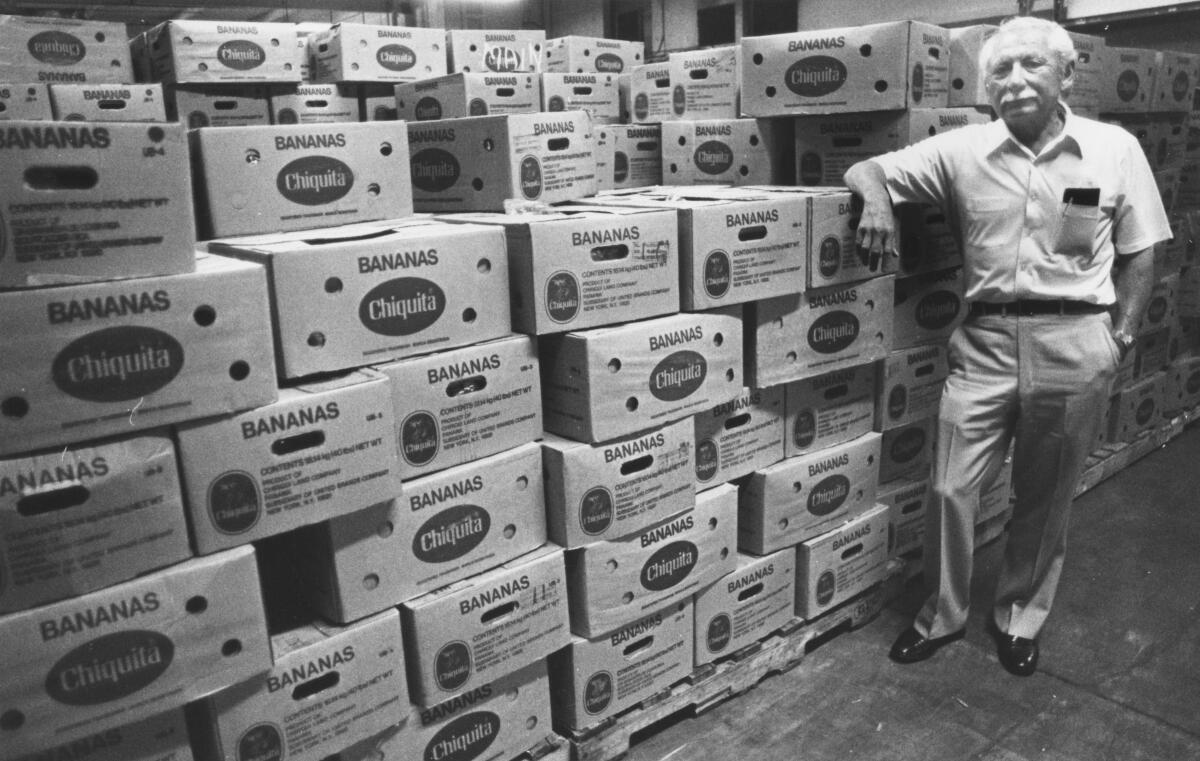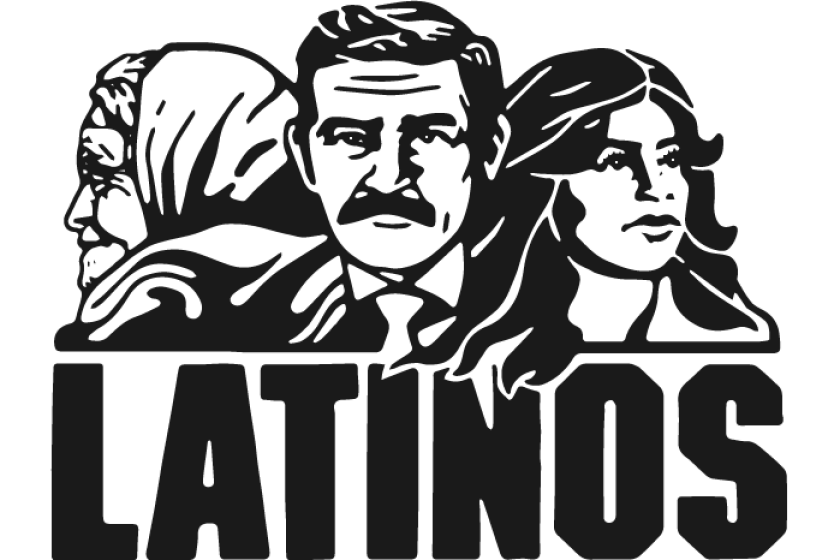Top Latino firms took gambles that paid off

- Share via
In 1947, Robert Alvarez wasn’t particularly interested in leaving his secure job as a grocery store manager to join his cousin, Henry Castellanos, selling produce. “I thought I had a good job, but my cousin was kind of a funny guy,” Alvarez, now 64, said. “He kept asking if I was going to be marking cans for someone else all the time.”
The answer, eventually, was no. Alvarez quit his job and “we started selling oranges off a truck.” Now chairman of San Diego-based Coast Citrus Distributors Inc., Alvarez laughs at the humble beginnings of his produce house which sold $72.8 million worth of fruit and vegetables to wholesalers and retailers in 1982.
For many minority groups — Latinos included — entrepreneurship is not a deeply-rooted tradition. Having a “good job” meant finding a steady job that paid a-decent salary, had good benefits and lifetime security. It is also one of the many reasons that Latinos and blacks have a lower rate of business ownership than their Anglo counterparts.
This makes it all the more remarkable when bold, minority entrepreneurs such as Alvarez and his cousin take a dream and turn it into a successful and lasting money-making venture.
In Southern California, 12 of the leading Latino-owned businesses play different variations on the success story of Coast Citrus. The revenues of these 12 businesses total $300 million. While this falls way short of even the smallest of the Fortune 500 firms, it does mark the tip of growing small- and medium-sized businesses owned by Latinos.
In 1977, the latest year for which statistics on minority-owned businesses are available, Latinos nationwide owned 219,355 companies with gross annual receipts of $10.42 billion. This is a dramatic increase from 199 figures when there were 100,212 Latino-owned business with gross revenues of $3.36 billion.
In the summer of 1983, The Times published a series on Southern California’s Latino community.
The data from those two years aren’t strictly comparable because in 1977 the Census Bureau expanded the scope of service industries included in the survey and added European Hispanic-owned firms. Based on the more comparable number of 177,921 firms (which excludes the newly included industries and European firms), companies owned by Latinos jumped nearly 78% and gross receipts mushroomed 152% during the 8-year span.
That phenomenal growth rate, however, masks a high failure for minority businesses, which parallels the high dissolution rate (both voluntary and involuntary) for all small businesses.
For example, 66% of the 5,187 Latino-owned businesses in Los Angeles in 1972 had closed their doors by the 1977 survey. But during that same period, more than 4,000 new Latino-owned businesses started, bringing the total in Los Angeles to 6,945, the Census Bureau said.
Minority firms as a whole comprised 5.7% of all U.S. businesses of comparable size and 3.5% of revenues in 1977. Los Angeles County had the heaviest concentration of Latino-owned businesses in the nation in 1977.
Service and retail trade companies made up the largest percentage of Latino firms in 1977. Personal service companies was the industry group with the largest number of firms while automotive dealers and service stations had the highest gross revenues.
If Latino-owned businesses share anything beyond the ethnicity of their owners, it is their small size.
Only 36 U.S. Latino-owned firms employed more than 100 persons in 1977, and 440 companies had gross receipts of $1 million or more. Latino-owned companies nationwide averaged nearly five employees per firm.
The experiences of Carlos Caravia and his family-run Komfort Industries Inc. is a good example of the typical Latino-owned business.
The Caravia family arrived from Cuba in the 1960s, and were interested in starting a garment business such as father Carlos Caravia had run in Cuba before the government confiscated his property. In late 1967, Caravia and his sons Manuel and Jorge found two partners who knew a little about building travel trailers-the kind you hitch to your car when you go on vacation. Each of the five put up $500, and a business was born.
As it turned out, the new partners knew very little about building travel trailers; the five labored for three months on their first trailer with disastrous results.
“The first product that we built was a complete flop,” Manuel Caravia, president of Komfort Industries, said.
“We started showing it (the trailer) around and people were laughing at us: It was too narrow. We didn’t know. We’d never built a trailer before.”
They learned. The next trailer took 45 days to build. Caravia hitched the trailer to his 1955 Mustang and hauled it from dealer to dealer until he found one who would handle it.
Today, Komfort’s Riverside factory turns out 20 trailers a day. The company also has factories in Oregon and Texas and plans to begin building a fourth plant late this year in the Northeast.
That single trailer has grown into a line available in 39 sizes and 69 floor plans. The Caravias eventually bought out their partners. Jorge is vice president of operations and Carlos is vice president in charge of trailer interior design.
Manuel Caravia is at a loss to explain why neither recession nor gasoline shortages has slowed the continuous growth of his company.
“You need an RV (recreational vehicle) like I need a hole in my head,” he said, shrugging, “but business has been growing.” If the current sales pace continues, Komfort will record revenues of between $45 million and $50 million in 1983.
“The people who have the buying power, they’re not worried about the recession,” Caravia said.
“They’ve been holding back so long, they don’t want to hold back any more.”
Robert Alvarez of Coast Citrus tells a similar story of struggle to make his business successful.
The firm has enjoyed a fairly steady growth record even though the wholesale produce business has been shrinking during the past 20 years as large supermarket chains have, in many instances, become their own produce suppliers. This reduced the need for independent wholesalers like Coast Citrus.
Coast Citrus was also hurt by last year’s closure of FedMart stores, a large account, and by Mexico’s peso devaluations and subsequent austerity program, Alvarez said.
The pain of those two events could have been worse if Alvarez had not decided several years ago to diversify, widening the line of produce Coast handles and opening a Los Angeles office to increase the company’s territory. Los Angeles has since become Coast’s biggest operation.
“If we hadn’t, we’d probably be out of business because the middle men are slowly closing up,” Alvarez said. “It’s very competitive, this business.”
Results for 1983 will be lower than for the previous year, Alvarez added, but revenues could reach 960 million if sales continue at the current rate.
(Alvarez bought his cousin’s share of the company in the early 1960s when Castellanos decided to open another produce business with his son in Los Angeles. Alvarez’s wife, Margarita, became president of Coast Citrus, and several of his sons have joined the company.)
Alvarez maintains that he never faced any discrimination in the business world and that minority-owned companies receive a fair shake in the marketplace.
“With business people, it’s a matter of money,” he said. “If you can do it better, they don’t care . . . who you are or what color you are.”
12 Latino-Owned Businesses in the Southland
The following list of some of the largest Latino-owned companies in Southern California was compiled by Times reporters from data supplied by the companies. lt does not include financial institutions and foreign-owned businesses.
- La Reina lnc., Los Angeles; founded in 1958 by Mauro, Daniel, Rogelio and Alberto Robles, La Reina manufactures Mexican food products and plastic bags tor tortillas, and stages entertainment events; 500 employees; 1982 revenues, $25 million. Mauro Robles is president.
- Amex Systems lnc., Hawthorne; founded in 197 1 by Manuel R. Caldera, Amex manufactures and services electronic and aerospace products; 700 employees; 1982 revenues, $60 million.
- Schafer Bros. lnc., Garden Grove; a furniture manufacturer founded in 1940; current Chief Executive Robert J. Aragon bought a controlling interest in Schafer in 1974; 320 employees; 1982 revenues, $18.4 million.
- Coast Citrus Distributors, San Diego; a fruit and vegetable distributor founded in 1947; chairman, Robert R. Alvarez; 100 to 125 employees; 1982 revenues, $72.8 million.
- Komfort lndustries lnc.; Riverside, a trailer manufacturer founded in 1967; president, Manuel Caravia, left; 600 employees; 1982 revenues, nearly $40 million.
- Ramona’s Mexican Food Products Inc., Gardena; a food manufacturer founded in 1946; owned by former U.S. treasurer Romana Acosta Banuelos; 400 employees; 1982 revenues, $16 million.
- Vallarta Restaurants, Los Angeles; founded in 1959 by Ernie and Vicki Tamayo, Vallarta operates La Villa Taxco, Casa Vallarta and Pollo de Oro restaurants; 800 employees; 1982 revenues, $13 million.
- Del Manufacturing Co., Oxnard; makes and assembles metal parts of government contracts; founded in 1946 by Augustin Delgado; current president, Manuel Delgado; 200 employees; 1982 revenues, Manuel Delgado; 200 employees; 1982 revenues, $12 million.
- Rubio Meat Co., Orange; founded in 1952 by Manuel Rubio; 27 employees; 1982 revenues, $12 million.
- Cabo Distributing Co., Los Angeles; a liquor distributor founded in 1972 by Federico Cabo; 33 employees, 1982 revenues, $11.5 million.
- ARGA’s Mexican Food Products Inc., Whittier; founded by the Arciniaga family in 1959; current president, Robert S. Arciniaga; 195 employees; 1982 revenues, $10 million.
- Best Western Paving Co., Bell Garden; owner James R. Ortega; 60 employees; 1982 revenues, $10 million.
This story appeared in print before the digital era and was later added to our digital archive.
More to Read
Sign up for Essential California
The most important California stories and recommendations in your inbox every morning.
You may occasionally receive promotional content from the Los Angeles Times.














